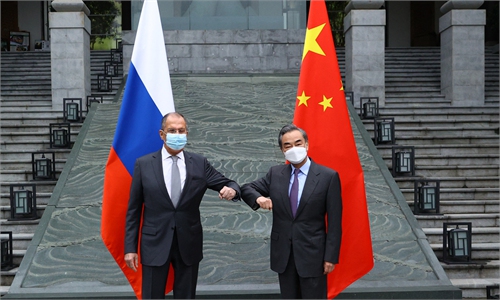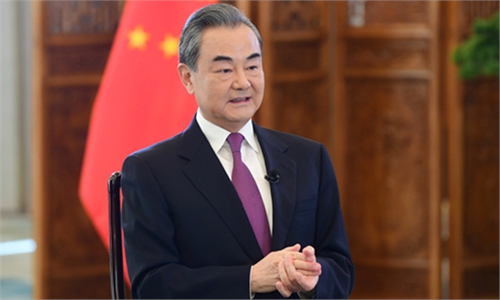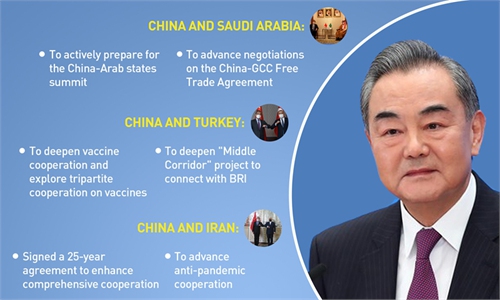Frequent interactions with Asian countries shows China’s ‘unshakable role as regional stabilizer’
External forces want to use Myanmar, Korea issues to ‘split region’
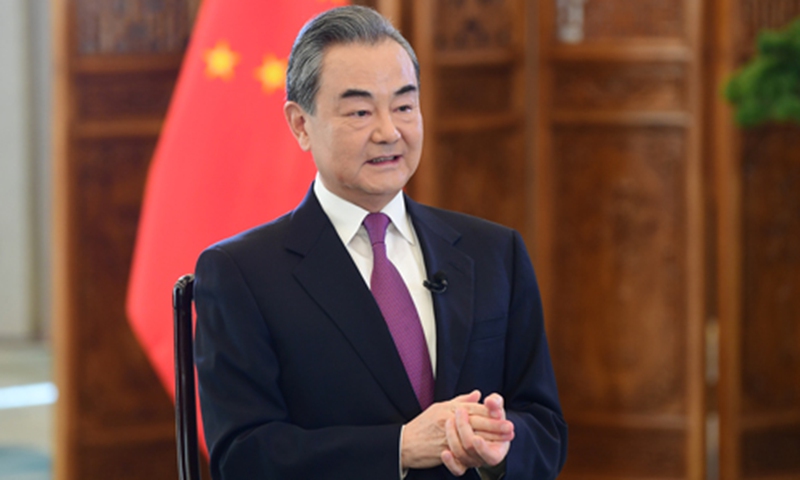
Chinese State Councilor and Foreign Minister Wang Yi
Asia is facing regional challenges and external impacts, as the Myanmar unrest is worsening and the Korean Peninsula nuclear issue is also being affected by the so-called Indo-Pacific Strategy of the US, and China's "role of stabilizer" for the region is getting more and more important, as Asian countries, including some US allies, have sent envoys to Beijing to coordinate hot spot issues with China.
Following the trip made by Chinese State Councilor and Foreign Minister Wang Yi to the Middle East after he met Russian Foreign Minister Sergey Lavrov on March 22 and 23, China has continued to conduct frequent diplomatic activities in recent days. After the three-day visit to China made by foreign ministers of the four key ASEAN members - Indonesia, Singapore, Malaysia and the Philippines - China will also receive South Korean Foreign Minister Chung Eui-yong from Friday to Saturday.
Chinese chief diplomat Yang Jiechi, a member of the Political Bureau of the Communist Party of China (CPC) Central Committee and director of the Office of the Foreign Affairs Commission of the CPC Central Committee, also met with ambassadors from three Asian countries - Cambodia, Laos, and Kuwait, according to the Xinhua News Agency on Tuesday.
Chinese analysts said no matter what the US says about China, such as smearing China on "destabilizing the region" or challenging the "rules-based international order," most Asian countries, including some US allies or the countries with territorial disputes with China, have still recognized China as a significant major power in the region to ensure the stability and to boost economic development.
The frequent diplomatic activities that China had had and will have with other Asian countries are focusing on fighting COVID-19, boosting economic recovery, building the Belt and Road with high quality, and keeping regional countries united on the hot spot issues, to avoid being divided by external forces, especially the US, said experts.
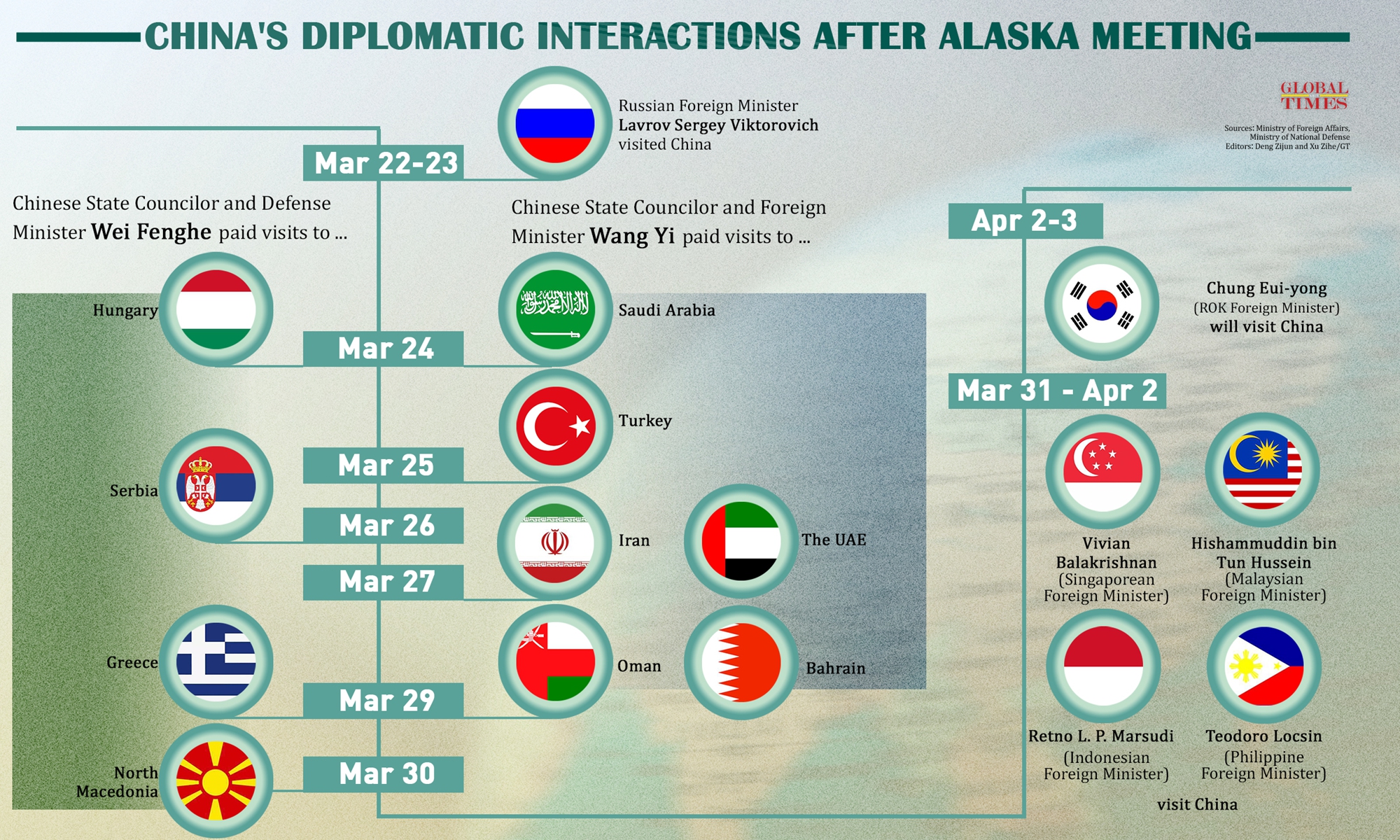
China's diplomatic interactions after Alaska meeting Infographic: Xu Zihe/GT
Reliable partner
Xinhua reported that Wang Yi met Singaporean Foreign Minister Vivian Balakrishnan in Nanping city, East China's Fujian Province.
Wang said at a press conference after the meeting that the two countries should work together to oppose "vaccine nationalism" and to prevent "vaccine divide," calling for both sides to jointly upgrade the level of China-ASEAN relations.
The meeting has sent a positive signal of economic recovery and reopening in the region, as Singaporean media Straits Times reported that "Travel between Singapore and China may soon resume if the two sides can work out a system to mutually recognize each other's health certification and exchange personal information," as the two foreign ministers "have spent a considerable amount of time" to discuss the matter.
Singaporean foreign minister Vivian Balakrishnan also said his country is willing to exchange views with China on upgrading the ASEAN-China Free Trade Agreement, and to enhance the level of cooperation between ASEAN and China, Xinhua reported.
Xu Liping, director of the Center for Southeast Asian Studies at the Chinese Academy of Social Sciences, said that Singapore is "the brains" of the ASEAN, and coordination and cooperation between China and Singapore will greatly guide China-ASEAN cooperation, and issues like vaccine and trade are significant for regional stability and recovery, and China is ASEAN's most reliable and powerful partner.
Keep stable
China supports ASEAN to uphold the principles of noninterference in internal affairs and help cease chaos and resume stability in Myanmar the ASEAN way, Wang said at the press conference.
Balakrishnan said, "Both of us agree that we should still respect the principle of non-interference in domestic matters. Ultimately, the fate and the future of Myanmar lies in the hands of its own people," the Straits Times reported.
China and Malaysia seek to strengthen ties in a meeting held on Thursday between Wang Yi and Malaysian Foreign Minister Hishammuddin Hussein. The two ministers met in Nanping to discuss regional and international issues of mutual concern.
Li Haidong, a professor at the Institute of International Relations of the China Foreign Affairs University, told the Global Times on Thursday that the worsening Myanmar unrest is providing a perfect excuse for external forces to intervene, and the US and its Western allies want to use it to further destabilize the region and create more disputes within ASEAN and between ASEAN and China.
China and ASEAN are standing together and release similar voices on the matter, which is crucial for the region to prevent intervention from foreign countries, so that they can focus on seeking a solution on their own and conduct mediation between different forces in Myanmar, said Chinese experts.
Some observers also said the activities of the US or Western proxies and agents could also be found behind the most recent conflicts between Myanmar military and the armed forces of ethnic groups.
Li said China should not just act as "stabilizer" but also needs to warn regional countries that they should stay alert to US intervention and hidden actions, "otherwise the tragedies in Ukraine, Syria and Libya would also occur in Myanmar and Southeast Asia, and that would be extremely unfortunate."
Korean Peninsula
After the visit of ASEAN foreign ministers, South Korean Foreign Minister Chung Eui-yong will visit China on Friday.
Yonhap News Agency reported that Chung and Wang are set to hold their first in-person meeting in their current capacities in Xiamen, Fujian Province on Saturday, and the two sides will discuss "bilateral ties, the Korean Peninsula situation and regional and global issues," according to a press release from the South Korean Foreign Ministry.
After the "2+2" dialogue with US senior officials last month, South Korea didn't follow the US closely to criticize China on regional issues or China's internal affairs. But on Tuesday, Seoul participated in signing a joint statement led by Washington to attack the credibility of a joint WHO-China report on tracing the origins of COVID-19.
Cheng Xiaohe, an associate professor at the Renmin University of China in Beijing, told the Global Times on Thursday that South Korea is trying to find a balance between China and the US, so it will have to please the US from time to time, but Chung's visit this time is meaningful for China, "especially when the US is strengthening its alliance to pressure China."
The Wang-Chung meeting would include exchanging views on the peninsula situation, discussing how to continue the denuclearization of the peninsula, and how to handle potential tension in the near future, Cheng said, noting that China will keep playing its role as stabilizer, and will bridge Pyongyang and Seoul to talk and solve problems in a peaceful manner.
Xi Jinping, general secretary of the CPC Central Committee, has said that China is willing to work with North Korea and other related parties to uphold the political settlement of the Korean Peninsula issue and preserve peace and stability on the peninsula, so as to make new contributions to regional peace, stability, development and prosperity, Xinhua reported.
Xi made the remarks in an exchange of verbal messages with Kim Jong-un, general secretary of the Workers' Party of Korea (WPK) of North Korea. The messages were delivered by Song Tao, minister of the International Department of the CPC Central Committee, and Ri Ryong-nam, North Korean ambassador to China, during their meeting on March 22 in Beijing.
Ri conveyed a verbal message from Kim to Xi, gave a comprehensive briefing on the eighth Congress of the WPK, and spoke highly of the fact that under Xi's leadership, the CPC and the Chinese people have succeeded in combating the global public health crisis and made remarkable achievements in completing the building of a moderately prosperous society in all respects and in the struggle for the complete eradication of poverty.

